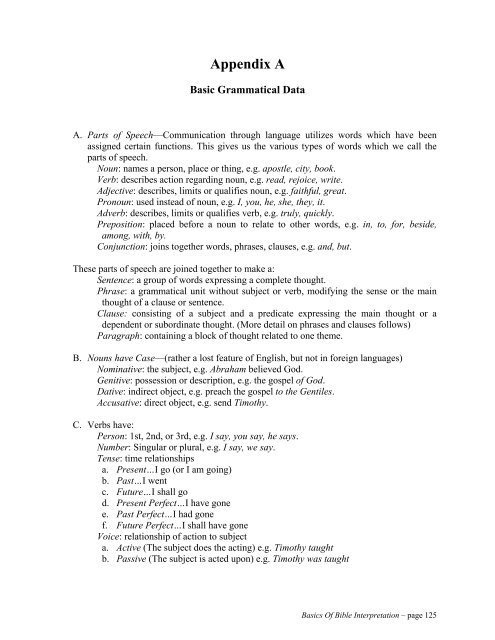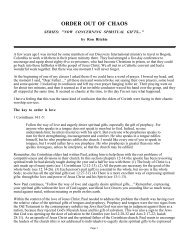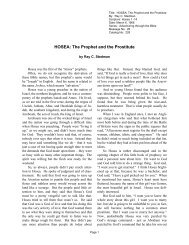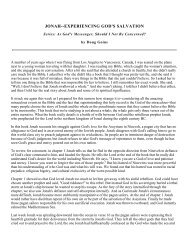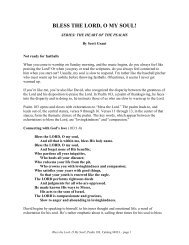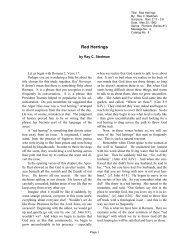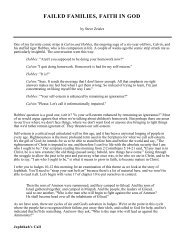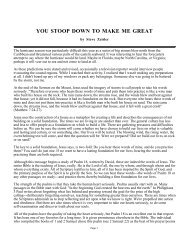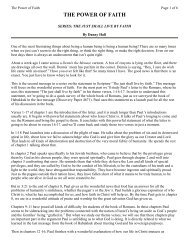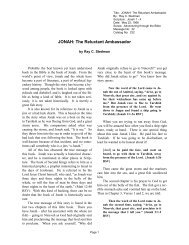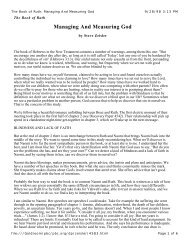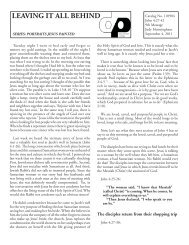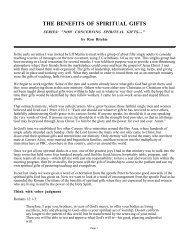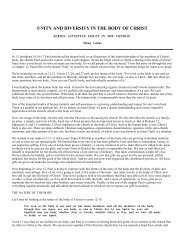Basics of Bible Interpretation - RayStedman.org
Basics of Bible Interpretation - RayStedman.org
Basics of Bible Interpretation - RayStedman.org
Create successful ePaper yourself
Turn your PDF publications into a flip-book with our unique Google optimized e-Paper software.
Appendix A<br />
Basic Grammatical Data<br />
A. Parts <strong>of</strong> Speech—Communication through language utilizes words which have been<br />
assigned certain functions. This gives us the various types <strong>of</strong> words which we call the<br />
parts <strong>of</strong> speech.<br />
Noun: names a person, place or thing, e.g. apostle, city, book.<br />
Verb: describes action regarding noun, e.g. read, rejoice, write.<br />
Adjective: describes, limits or qualifies noun, e.g. faithful, great.<br />
Pronoun: used instead <strong>of</strong> noun, e.g. I, you, he, she, they, it.<br />
Adverb: describes, limits or qualifies verb, e.g. truly, quickly.<br />
Preposition: placed before a noun to relate to other words, e.g. in, to, for, beside,<br />
among, with, by.<br />
Conjunction: joins together words, phrases, clauses, e.g. and, but.<br />
These parts <strong>of</strong> speech are joined together to make a:<br />
Sentence: a group <strong>of</strong> words expressing a complete thought.<br />
Phrase: a grammatical unit without subject or verb, modifying the sense or the main<br />
thought <strong>of</strong> a clause or sentence.<br />
Clause: consisting <strong>of</strong> a subject and a predicate expressing the main thought or a<br />
dependent or subordinate thought. (More detail on phrases and clauses follows)<br />
Paragraph: containing a block <strong>of</strong> thought related to one theme.<br />
B. Nouns have Case—(rather a lost feature <strong>of</strong> English, but not in foreign languages)<br />
Nominative: the subject, e.g. Abraham believed God.<br />
Genitive: possession or description, e.g. the gospel <strong>of</strong> God.<br />
Dative: indirect object, e.g. preach the gospel to the Gentiles.<br />
Accusative: direct object, e.g. send Timothy.<br />
C. Verbs have:<br />
Person: 1st, 2nd, or 3rd, e.g. I say, you say, he says.<br />
Number: Singular or plural, e.g. I say, we say.<br />
Tense: time relationships<br />
a. Present…I go (or I am going)<br />
b. Past…I went<br />
c. Future…I shall go<br />
d. Present Perfect…I have gone<br />
e. Past Perfect…I had gone<br />
f. Future Perfect…I shall have gone<br />
Voice: relationship <strong>of</strong> action to subject<br />
a. Active (The subject does the acting) e.g. Timothy taught<br />
b. Passive (The subject is acted upon) e.g. Timothy was taught<br />
<strong>Basics</strong> Of <strong>Bible</strong> <strong>Interpretation</strong> – page 125


